Leveraging Interactive Voice Response to train nurses on vaccine hesitancy in Ghana
Solution: Digital SurveyDigital Training
In association with
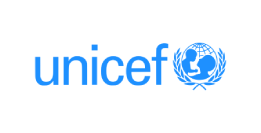
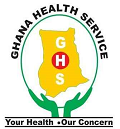
Overview
Ghana was the first country to receive COVID-19 vaccines through the COVAX scheme in the first half of 2021. A nationwide deployment of the vaccine began in March 2021, with President Nana Akufo-Addo being the first Ghanaian to receive it to boost confidence and trust. Over the next four months Ghana had vaccinated nearly 381,000 people, representing 1.3 percent of the population. While some progress has been made since then, COVID-19 vaccine hesitancy remains a challenge with less than 25 percent of the population fully vaccinated.
The national vaccine hesitancy rate in Ghana is 30 percent, with people under 25 years of age leading the hesitancy score, according to the partnership for evidence-based response to COVID-19 report by the Ministry of Health.
The Ghana Medical Association (GMA) and Ghana Registered Nurses and Midwives Association (GRNMA) blame high vaccine hesitancy and abandonment of safety protocols for the recent spike in COVID-19 infections. An estimated 40 percent of health workers have not received the second vaccination dose, and less than one percent have received booster doses, according to the GMA’s president.
”We see these developments as worrying, especially concerning health workers. This is because health workers, particularly doctors, nurses and midwives, are not only on the frontline of care, but remain the most trusted sources of information and access to vaccination.
Frank SerebourPresident of the GMA
Against this backdrop of vaccine hesitancy among Ghana’s healthcare workers, the Ghana Health Service, UNICEF Ghana, and Viamo jointly trained over 1,000 health workers as vaccination champions, strengthening their capacities in risk communication and community engagement, as well as addressing misinformation about COVID-19 vaccination.
1025
96
90
Due to the sudden nature of the COVID-19 outbreak, preparedness, reactivity, and proactive measures have been highlighted as important to curtailing a pandemic. It is often the availability and accessibility of healthcare personnel that affects the quality, effectiveness, and well-being of healthcare provided to people. Nurses are among the key factors that determine the availability of healthcare.
For Ghana, like other affected nations, well-trained and equipped health workers are crucial to the nation’s recovery from the pandemic. In most cases, nurses are the main contact for vaccinations and immunizations. In the face of COVID-19 restrictions and social distancing protocols, other training platforms and tools became vital in building the capacity of front-line health workers, such as nurses, to provide a continuum of care to community members.
Launched in 2015, the multi-language Interactive Voice Response (IVR) platform Agoo was co-designed and developed by UNICEF and Viamo to deliver life-saving information to Ghanaians using mobile technology. With Telecoms partner MTN, the platform, which handles over 2,000 calls a day, can be accessed from a phone number, is free for MTN subscribers, and available to all Ghanaians with access to a mobile phone. Across Ghana, the Agoo platform has since received almost five million calls relating to key behavior change communication messages to millions of people in six local languages. After the outbreak of COVID-19, the platform became even more useful both for information sharing and for launching Digital Training for frontline workers.
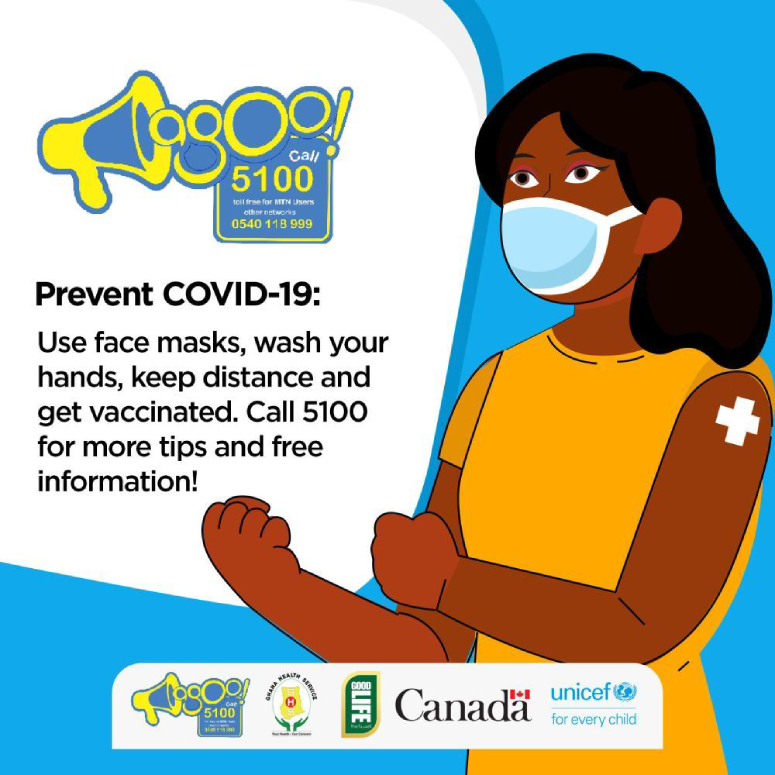
What we did
We developed a Digital Training program together with UNICEF to assist front-line health staff in fulfilling their mandate effectively without disrupting their daily activities, which was hosted on the Agoo platform. Training modules were adapted from content provided by UNICEF.
Lessons, which included a narrative on a relevant topic followed by a quiz, included topics such as how to address hesitancy and effective communication on vaccines. Courses covered key topics such as attitudes, beliefs, biases, motivations, psychological makeup and other personal factors that might contribute to vaccine hesitancy. Learners were taught how to communicate effectively, avoid judgment, use body language to convey interest in the other’s values and beliefs and avoid instilling fear and spreading rumors.
Over a period of five weeks, learners received key messages and tips on their phones through IVR short calls allowing them to learn at their own pace. The calls were provided free of charge and could be accessed as many times as needed through the Agoo platform.
A total of 1,025 frontline health care workers, particularly nurses, participated in the training.
Results
Prior to each lesson, an introductory survey was carried out to gauge learners’ knowledge level of COVID-19 vaccination and protocols. Courses were then delivered in a series of ten lessons that addressed key topics, and quizzes on the content delivered were provided at the end of each lesson. Post-training data revealed that 92 percent of learners answered quizzes correctly, showing that lessons were well understood, and depicting nurses’ preparedness to apply the right approach in addressing specific issues related to COVID-19 vaccine hesitancy. 96 percent of nurses also correctly identified reasons for vaccine hesitancy in patients.
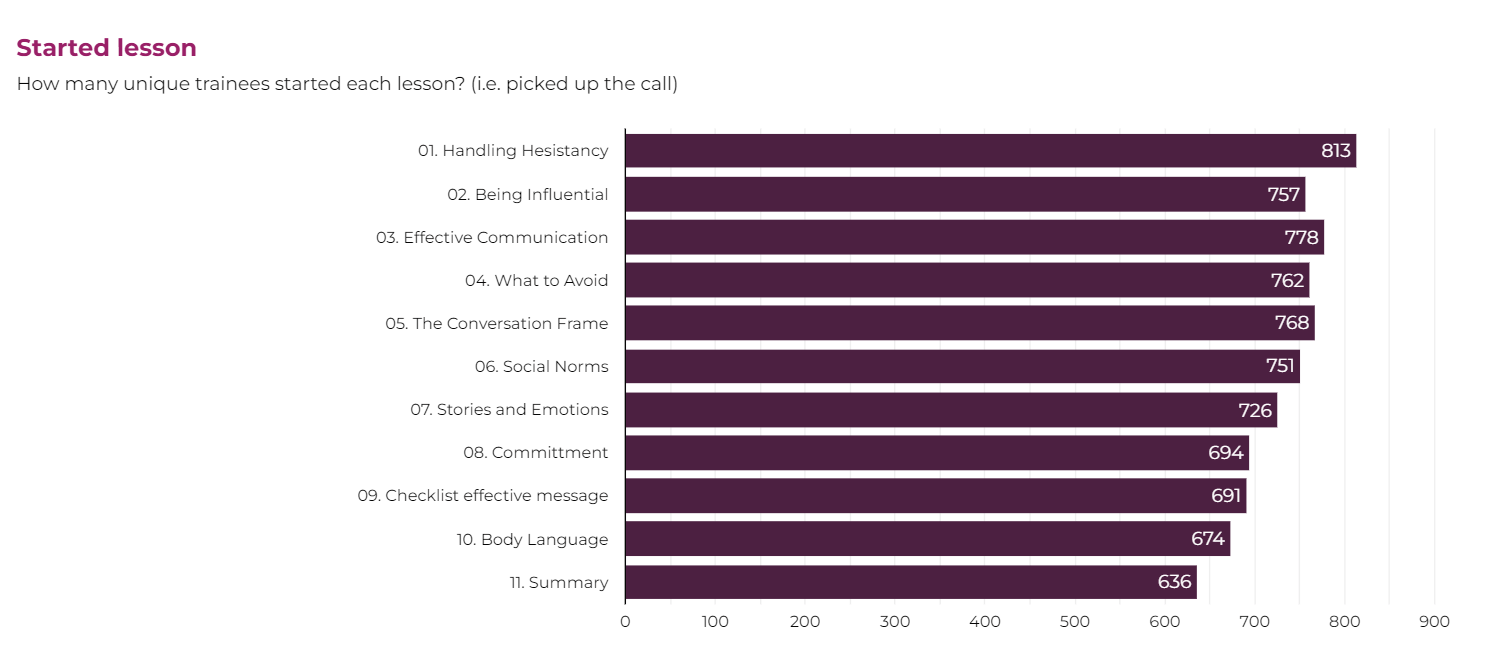
Data shows learners who picked up calls and started lessons
Findings also suggested that nurses’ competency in dealing with vaccine hesitancy has improved in all the thematic areas of the course including handling hesitancy, how to be influential whilst communicating effectively, what to avoid during discussions, how to frame conversations using stories and emotions, showing commitment tasks while applying social norms and body language to communicate effectively, as well as properly maintaining a checklist for effective messages.
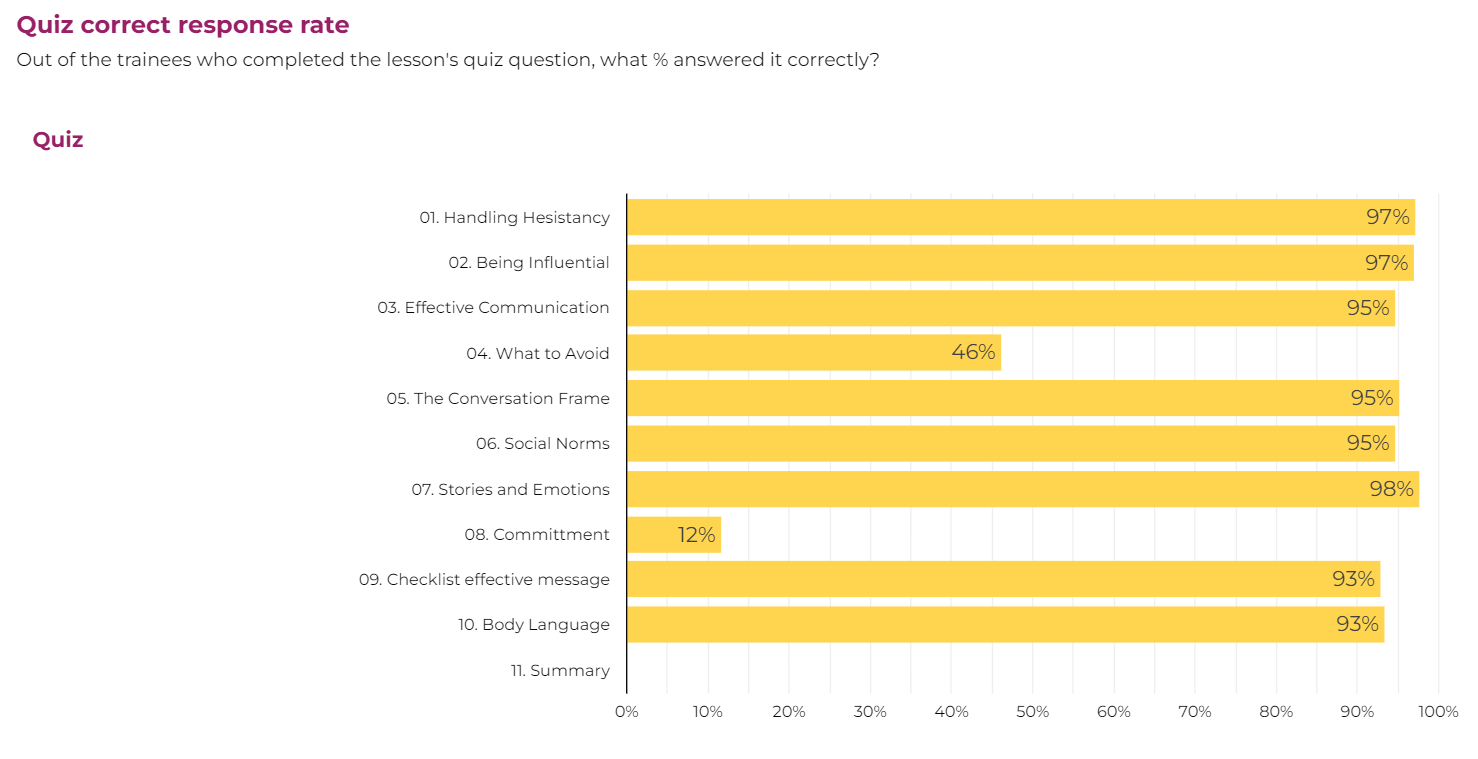
Data shows percentage of learners who answered quiz questions correctly
Asked whether there is a need to identify why a frustrated person may not want to get vaccinated, 95 percent of learners correctly answered that it is necessary. On being influential, 96 percent answered correctly that people are more likely to follow when others have already accepted the arguments of health personnel.
”I participated in the mobile training course and I must say that It was very educative. It centered on and really explained how to talk to patients and potential clients about the COVID-19 vaccination program and how to convince them when they raise doubts. I liked the fact that even if I missed a call, I could call back and listen to the lesson. This helped me a number of times. Some of the approaches I learned about in the lessons were very helpful. In fact, when I used these approaches, I was able to convince some people to go on and take the vaccine even though they were initially hesitant.
LydiaCommunity Health Nurse from Tanoso Health Center
What we learned
An introductory study exploring survey data collected from the Agoo IVR platform over vaccine hesitancy training for nurses in Ghana revealed a change in the behavior and perception of nurses after going through the IVR training. We envision that our recommendations will serve as a guide for similar training in the future.
In addition to bridging the digital divide, IVR is complementary to other channels. Digital Training can therefore complement broader training programs, refresher/follow-up training, even if it is not a replacement for all in-person training. Having local voices and language tailored to learners’ preferences, and being able to train people on devices they already own, makes it even more valuable to low-resource populations. Using IVR also provides a tailored training experience, with a limited learning curve when partaking as people will be completing the training on devices they already use. In the words of our partner UNICEF, ‘IVR works!’
As with any major national undertaking, such as the rollout of COVID-19 vaccines, a whole-of-society approach is needed both before and during vaccination. Through strong leadership and support from the Ghana Health Service, government collaboration proved critical to the success of this project. This has highlighted the importance of establishing multi-sectoral partnerships at every level, including with government and development partners.
Even though the project is now concluded, there will be two follow up digital training initiatives for frontline health workers across Ghana.
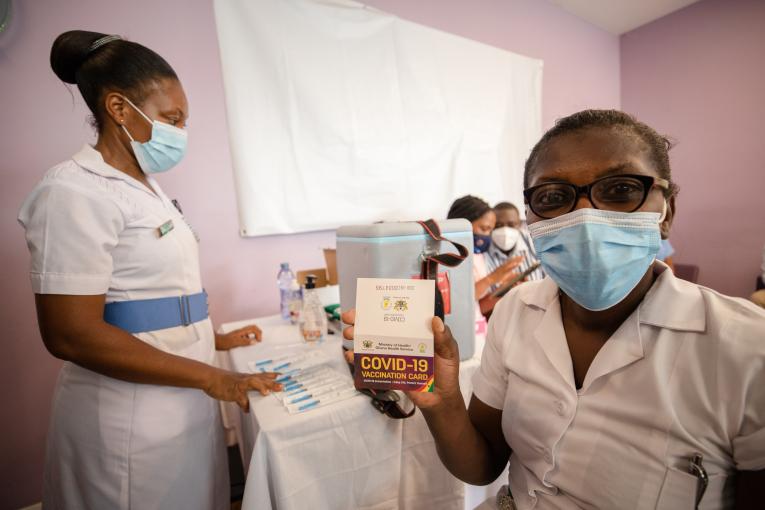
A health worker shows a COVID-19 vaccination card after receiving the vaccine at the Ridge Hospital in Accra, Ghana, March 2021. (credit: UNICEF)
Future
While Ghana’s rollout of COVID-19 vaccines has been praised for its planning, speed, and high-level leadership, there are still valuable lessons to be learned from using digital technologies to share critical information with far-flung communities and help build trust in vaccines.
Misinformation remains a constant challenge in Ghana in ensuring public acceptance of COVID-19 vaccinations. Initiatives like the Agoo platform have become even more useful for not just information sharing but also remote micro training for frontline workers. As this training proved successful based on the data collected so far, UNICEF and Viamo plan to roll out similar training for other frontline staff not just in the health sector but also in education, child protection and social policy among other programmatic areas.
